|
12 Queen Street
9-13 Queen Street

Deal
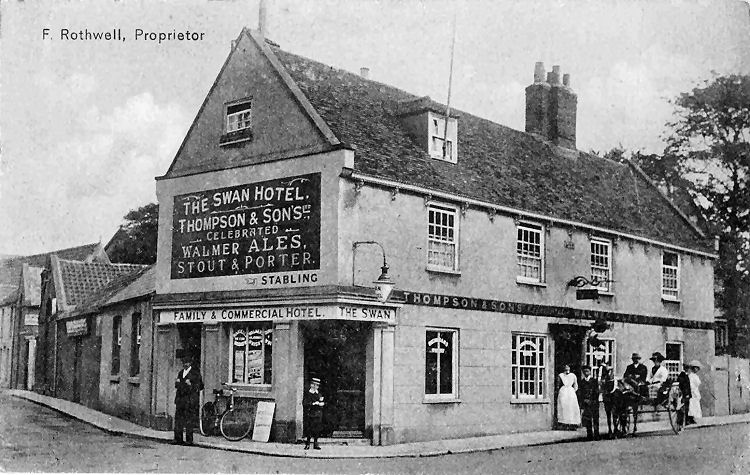
Above postcard, circa 1908. |
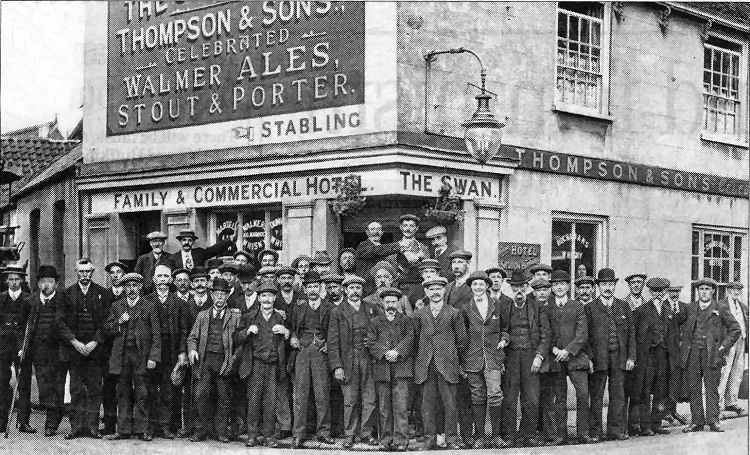
Above photo, date unknown. |
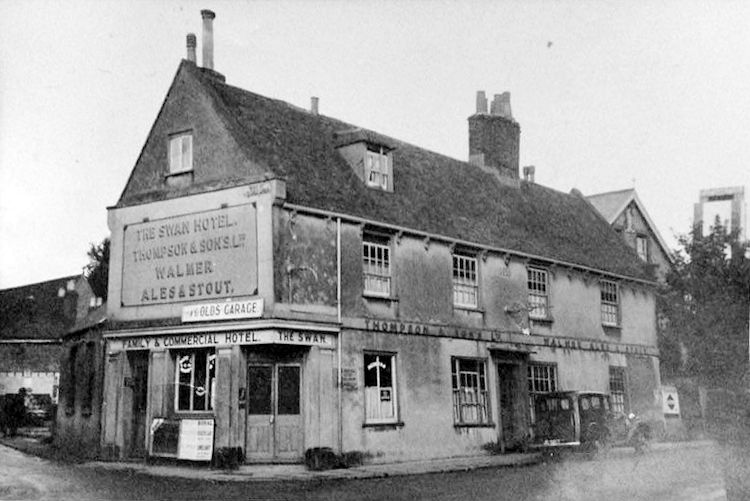
Above photo, circa 1936. Kindly sent by Rory Kehoe.
The caption tells us that "...This picture was taken in October 1936
by Mr Mapherden Young, who was a professional photographer, whose
premises were on the High Street, Deal. The photo had been ordered by Mr
Watts, of Kent House, Upper Deal..." Originally a tied house of Hill's
Deal Brewery, the Swan formed part of their 63-strong pub estate,
purchased at auction in the summer of 1901 for £93,000, by local rivals,
Thompson's Walmer Brewery. |

Above shows the original "Swan Hotel" before being replaced in 1938. |

Above photo shows the new "Swan Inn" rebuilt in 1938 by the Walmer
brewers, Thompson and Sons.
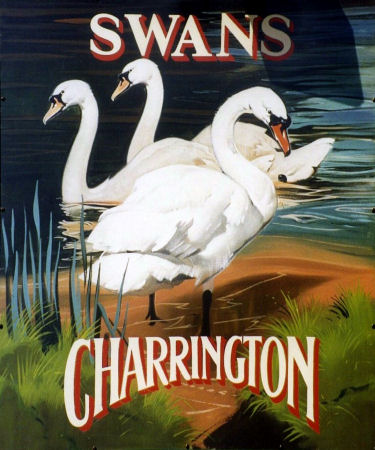 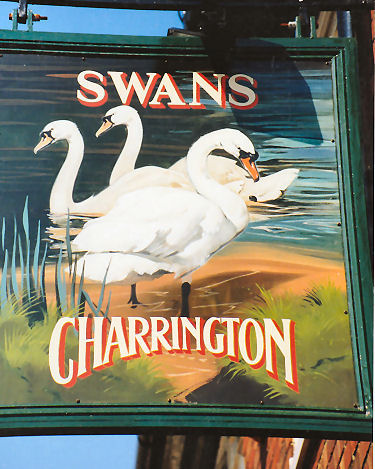
Above sign left, 1991, sign right, date unknown.
With thanks from Brian Curtis
www.innsignsociety.com. |
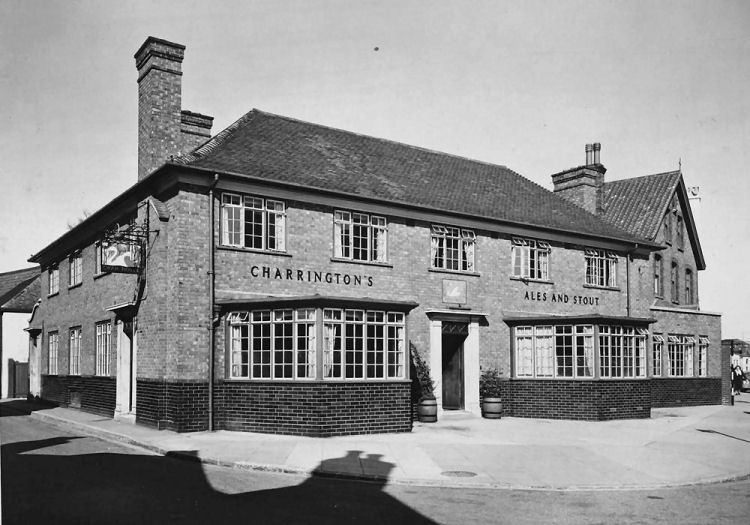
Above photo 1952.
Creative Commons Licence. |

Thompson & Son ledger.
Creative Commons Licence. |
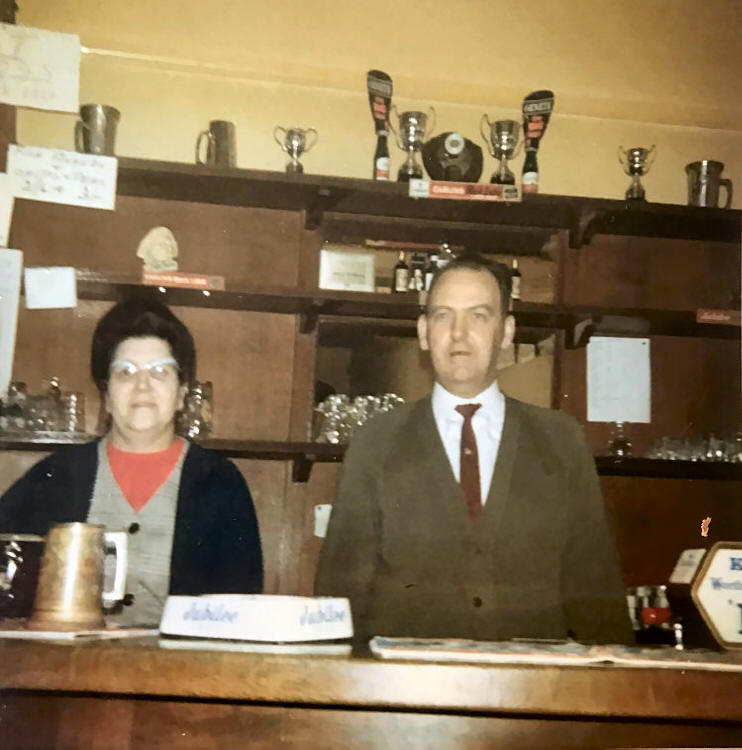
Above photo circa 1970 showing licensees Bob and Ruby Rowe, kindly sent
by grand daughter Freya Rowe. |
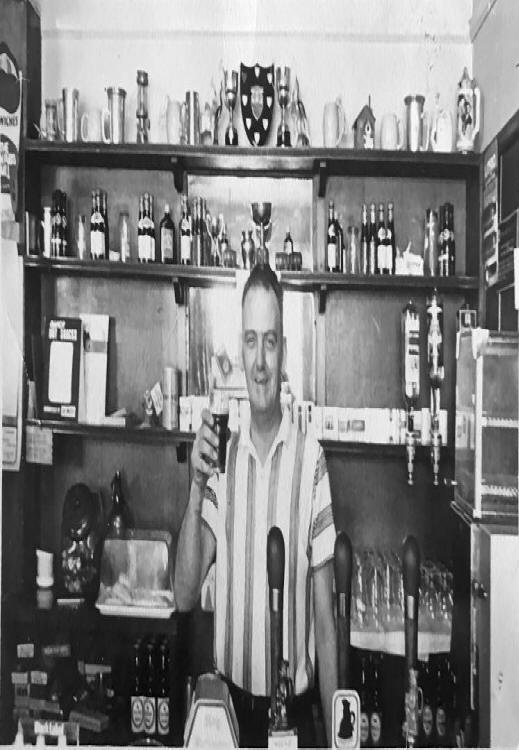
Above photo circa 1970 showing licensee Bob Rowe, kindly sent by grand
daughter Freya Rowe. |
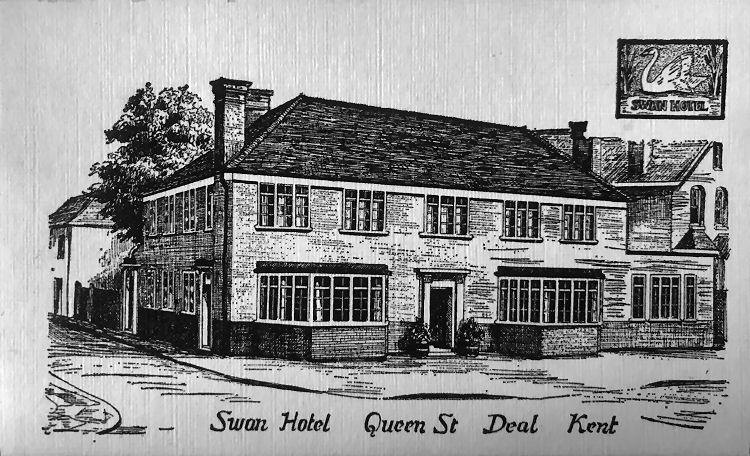
Above card circa 1970 kindly sent by grand daughter Freya Rowe. |

Above card page 1, circa 1970 kindly sent by grand daughter Freya Rowe. |
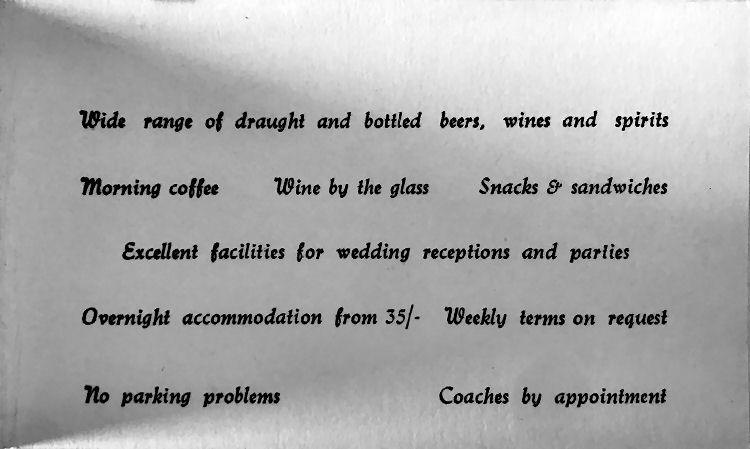
Above card page 2 circa 1970 kindly sent by grand daughter Freya Rowe. |
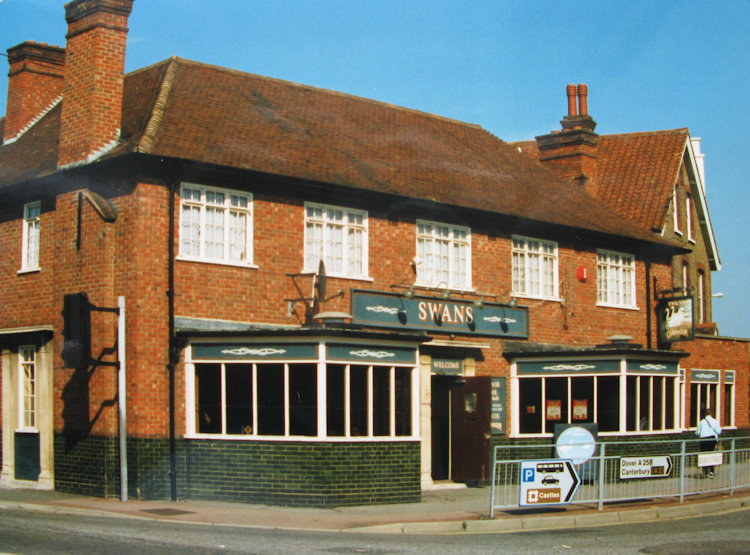
Above photo, 3 September 1996, by Jim Ashby. |
|
From the Kent Herald, 28 December 1826.
Deal.
On Christmas night several families in Queen Street were thrown into a state of
considerable alarm by a party of Irish soldiers at the "Swan" public house, who
brimful of gin or some other stimulus equally potent, rallied forth into the
street making a most hideous noise; they immediately commenced a furious attack
on the premises, breaking the windows, &c., and unceremoniously knocked down
divers of his Majesty's peaceable lieges.
Captain Pigott, who resides in the vicinity very laudably dispatched a messenger
for a picquet, which immediately repaired to the spot, and having furnished
several of the offenders with those "iligant" appendages yclept handcuffs,
"decently" marched them off to durance ville.
The disturbance arose from the landlord refusing the soldiers admittance to a
room which was occupied by a private party.
Since writing the above, several persons we understand received severe cuts,
which report says were inflicted by knives belonging to the landlord.
|
|
Kent Herald, 9 October 1845.
Swan Inn, Deal.
Henry Pocket begs to return his thanks to his friends and the public generally,
for the support he has received in the above house, and to acquaint them, that
having relinquished the business, he has been succeeded by his brother, John
Pocket, of Deal, Coach Proprietor.
All persons having any demands upon Henry Pocket are requested to send the
accounts thereof to the office of Mr. B. Hulke, Solicitor, Deal; and all persons
indebted to him are requested forth with to pay the amount of their respective
debts to the same place.
John Pocket, in commencing business as innkeeper, begs to assure the public and
those friends who might honour him with their patronage, that his unremitting
attention will be directed towards their comfort and convenience. Excellent
Livery Stables with good lockup Coach House, &c. &c.
Queen Street, 6th October, 1845.
|
|
From the Kentish Gazette, 14 October 1845.
"Swan Inn." Henry Pockett.
Begs to return his thanks to his friends and the public generally for
the support he has received at the above house, and to acquaint them,
that having relinquished the house, he has been succeeded by his brother
John Pockett of deal, Coach Proprietor.
All person's having any demand upon Henry Pockett are requested to send
account thereof to the office of Mr. H Hulse, solicitor, Deal; and all
Person's indebted to him are required forthwith to pay the amount of
their respective debts at the same place.
John Pockett.
In commencing businesses as innkeeper, begs to assure the public and
those friends who may honour him with their patronage, that's his
unremitting attention will be directed towards their comfort and
conveyance.
Excellent livery stables, with good lock-up Coach House, &c &c. Queen
Street, 6, Oct. 1845.
|
|
From the Deal, Walmer and Sandwich Mercury, 20 April, 1872.
Adverticement
7 acres of Lucern, Mill Road, to be sold by auction at the "Swan
Inn."
(Lucern, incidentally, is a flowering plant of the pea family,
cultivated as an important forage crop, and otherwise known as Alfalfa,
it resembles clover with clusters of small purple flowers. Paul
Skelton.)
|
|
From the Deal, Walmer, and Sandwich Mercury,
25 June, 1872. 1d.
VAGRANCY
A man giving the name of James Watts was brought up for being drunk
and sleeping in the coach-house of the "Swan Inn."
P.C. Pettet said: I was on duty this morning about half-past two in
Queen Street, in company with Sergeant Spicer. On going by the "Swan
Inn" we noticed that the door of the coach-house was open, and we went
in to see if anyone was about the premises. We found the prisoner lying
asleep on some ruffled straw. After some trouble we succeeded in waking
him, and he then told us in reply to our questions that he did not know
how he came there. He was drunk, but after a bit he was able to walk to
the station-house.
The Supt. said the landlord of the "Swan Inn" did not wish to
prosecute.
Prisoner, in reply to Magistrates, said he was a native of Wiltshire,
and was tramping round in search of work as a labourer. He had worked in
a lead manufactory, but could not stand it. He had worked five days at
Sandwich the previous week.
The Magistrates ordered him to be seen out of the town forthwith.
|
|
From the East Kent Mercury, 21st October, 1981
POSTING HOUSE
The "Swan Hotel" in Queen Street, Deal was built in 1694 - five years
before Deal received its Charter - and was called the "Five Bells." It
gave its title to the thoroughfare we know as Queen Street, for it was
then called Five Bells Lane.
Within 50 years the hostelry had changed its name to the "Swan" and
the first known record of a licensee is a Mr Brockman, who transferred
the license to Harry Pockett in 1840.
The "Swan" was famous as a posting house and had stabling for almost
40 horses. At the last great agricultural show held on Victoria Park,
over 100 horses were tethered at the "Swan." In 1881 it was virtually
destroyed by fire and some valuable horses belonging to the
Chipperfield's circus were badly burned.
Among those who stayed at the "Swan is Charles Dickens, who is said
to have written some chapters of David Copperfield whilst lodging there.
|
|
From the East Kent Mercury, January 7, 1988.
Tony Arnold takes a look back in time.
Street with a busy past.
Queen Street is one of Deal's busiest streets with traffic lights at
both ends, and so it has always been. Centuries ago when the
thoroughfare was known as Five Bells Lane, there was a toll gate roughly
where the railway bridge stands.
The flow of traffic in Queen Street became so great in the 1930s "as
to involve real danger to pedestrians". So in the New Year of 1933 Down
Town Council began widening work.
The office of the East Kent Mercury was not disturbed but all
property on that side of the road from the EKM office to the High Street
was demolished.
When the East Kent Mercury moved into Queen Street it took over a
residential property as offices. Its front garden was paved – and so the
property did not have to close down.
But among those which were demolished was the office of S. Olds, who,
before the coming of the railway, operated horse drawn coaches, and then
– moving with the times – introduced taxis to Deal. The business moved
into West Street.
Queen Street was once Deal's premier residential street, dominated by
Admiralty House, official home of the Port Admiral. This disappeared to
become an Odeon cinema, and on the site today stands a snooker club and
a wine bar.
One building which has not changed is the office of Williamson and
Barnes, the solicitors, which was used for sittings of local and county
courts. It was built as a bank.
Another property which has not changed very much is Neville House,
once the residence of Mr G. H. Denne, the builder, and for many years
the offices of Deal Town Council and Dover District Council. What will
happen to it now remains to be seen.
The oldest building in Queen Street was the Swan Hotel, now, of
course, rebuilt and modernised. The Swan was built in 1694 – five years
before Deal received its Charter – and was named The Five Bells, giving
its name to road which is now Queen Street.
The Swan was the posting house for Deal and had stabling for almost
40 horses. It is a local legend that Charles Dickens stayed at The Swan,
and while there penned some of the most moving chapters of David
Copperfield.
Article kindly sent to me from Patricia Streater.
|
It was also reported in H S Chapman, "Deal Past and Present 1890, that
when repairing the pub in about 1890, a dated stone was found showing 1694.
|
From the East Kent Mercury, 5 August, 1999.
Not a lot of people know ... by L.W. Cozens
... that during repairs and renovations to the old "Swan Inn" in
Queen Street in 1937, its former name being the "Five Bells," a cast
iron plaque was found bearing the date 1694. Beneath the old Swan were
large cellars, each with holes in the walls for candles. |
It is said by David G Collyer that Charles Dickins visited Deal for the
opening of the new railway in July 1847 and attended a reception to
celebrate that event, held at this pub.
By 1939 this establishment had the address 42 and 44 Queen Street.
An outlet for Charrington & Co. in 1974.

This public house has now changed name on the 10 September 1997 to the "Hole
in the Roof."
|
From the Dover Mercury, 23 August 2017. By Steve
Glover and Andrew Sargent
The old Hole in the Roof, due to reopen in the coming days as the "Queen
Street Tap," can claim to be Deal’s oldest pub - if one ignores the
fact that the premises were completely rebuilt in the 1930s.
In 1890, workmen repairing the building found a stone dated 1694.
It is likely that the "Five Bells," as it then was, did indeed date back
to the 17th century. Certainly its position in the magistrates’
registers suggests that by 1820 only the "Black Horse" on Lower Street,
now known as High Street, was thought to be older.
In the 18th century the "Five Bells" not only served beer but brewed it as
well. This was very common in Georgian times.
In some parts of the country “brew pubs” flourished for another 100
years, but in 19th century Kent the breweries came to dominate the drink
trade.
The "Five Bells" stood on what was then Five Bells Lane. This became Queen
Street around 1800, and in the 1820s landlord Brockman Beal changed the
name of the pub to the Swan. (I have this as
William Ladd in 1824. Paul Skelton.)
By now the house was owned by the larger of the two Deal breweries.
Mr Beal promoted his house as a “commercial inn and posting house”, and certainly the success of
the Swan Hotel - as it soon formally became - was based on the
accommodation, stables and carriage space it could offer to visitors,
and on the hiring of ponies and traps.
In 1838 the Swan’s outbuildings could accommodate 20 horses and six
coaches, and many more animals could be packed into the yard if
necessary. In 1900 the hotel itself had eight bedrooms, and two on the
ground floor, a “commercial
room”, sitting room, smoking room, a bar with two entrances and a bar
parlour.
Nationally, the arrival of the railways usually marked the decline of
the large coaching inns. But the opening of the line from Deal to
Minster in 1847, and the decision to build the station round the corner
from the Swan, seem if anything to have boosted its fortunes.
It did its reputation no harm that Charles Dickens was said to have
stayed there when visiting the town to witness the opening of the new
line.
In 1887, landlord Arthur Webster took pains to set out his stall (so to
speak) in the local directory: “very old established, one minute from
the station, family & commercial, livery & bait stables, ponies & traps,
masonic banquets & garden parties etc supplied with every necessary”.
Some landlords had other strings to their bows. George Rolfe was a horse
dealer - which made sense - while his successor in 1871, Vernon Brown
from Australia, also traded as a wine and spirits merchant and “agent
for Webb’s Superior Mineral Water of Islington”.
Soft drinks almost proved the Swan’s downfall. In 1881 fire broke out at
an adjacent building used to bottle mineral water and spread to one of
the hotel stables. The flames were eventually quenched, but a horse
worth 200 guineas
belonging to Sanger’s circus had to be put down.
The house seems generally to have been well run, but trouble could still
occur. In 1842, for example, the watch committee awarded PC Edward
Browning £110s in compensation for injuries sustained in the line of
duty when confronting a belligerent soldier in the Swan.
In 1908 Eliza Mackenzie was given a week’s hard labour for drunkenness
at the Swan “in company with a gentleman from the fleet”. In response to
her claim that she had intended to lead him back to his ship, the
magistrate commented dryly that “I have no doubt you were going to lead
him on”.
In 1874 the brewers, Hills and Sons, refurbished parts of the hotel
and added a smoking room. The work was carried out by the local builders
W & G Denne at the modest cost of £5,910s.
In 1901 Thompson & Son of Walmer bought the Hills brewery estate,
took possession of the Swan and advertised their ownership and their
products on a large sign on the side wall. The change of ownership and
beer aside, business probably continued much as before.
The Swan is a rare example of a Deal pub to have been completely
rebuilt between the two world wars. The initiative came from the
council, who persuaded the reluctant brewers to demolish the old
building to facilitate the widening of Queen Street.
In April 1937 the Mercury carried a rather poignant notification of
the auction of superfluous items from the old building. These included
“mirrors and overmantles, antique Trafalgar seat, easy Windsor and other
chairs, excellent Pianoforte, pictures, copper spirit jugs... and a
nearly new 5-pull Beer Engine”.
The new Swan Hotel soon took the place of the old, set back several
feet from the original site. Thompson could at least now boast of “a
thoroughly up-to-date hotel in every respect... hot and cold water in
every bedroom... handsomely and comfortably furnished throughout”.
Thompson was swallowed up by Charrington’s in the early 1950s but the
Swan Hotel it remained until the name was shortened to Swans in 1985.
In May 1997 Swans in turn became the "Hole
in the Roof," and a £160,000 refit followed in 1999. Over the years
it became a popular and successful live music venue.
The original name of the previous building, "Five
Bells," was later taken up by a pub in Middle Street. This closed in
1959. It nearly made a welcome return as the name of Wetherspoon’s new
pub in Queen Street, but a local campaign persuaded the company to call
it The "Sir Norman Wisdom"
instead.
|
LICENSEE LIST
 LADD William 1824+
LADD William 1824+

 BEAL Brockman 1828-40+
BEAL Brockman 1828-40+
   
POCKETT Henry "Harry" 1840-Oct/45 (age 25 in 1841 ) )
POCKETT John (brother) Oct/1845-47+

WARD Thomas 1851+ (age 48 in 1851 ) )
ROLFE George pre 1871 (also horse dealer)
BROWN Vernon 1871-74+

GARNER Charles Banks 1878+

GARNER Mrs 1881-1882+

KEYS George 1891+

YOUNG Horace 1899-1903+
 
YOUNG Miss C A 1908+ ( Old Swan Hotel) Old Swan Hotel)
ROTHWELL Frederick 1908-37+
   
GREEN Albert & June 24/Apr/1937-52+

FOSTER C W 1952-64+
ROWE John & Ruby 1970+
STEVENS Peter J & SHARP A W
 Charrington & Co
Charrington & Co
https://pubwiki.co.uk/Swan.shtml
 From the Pigot's Directory 1828-29 From the Pigot's Directory 1828-29
 From the Pigot's Directory 1832-33-34 From the Pigot's Directory 1832-33-34
 From the Pigot's Directory 1839 From the Pigot's Directory 1839
 From the Pigot's Directory 1840 From the Pigot's Directory 1840
 From Bagshaw Directory 1847 From Bagshaw Directory 1847
 From the Kelly's Directory 1878 From the Kelly's Directory 1878
 From the Post Office Directory 1882 From the Post Office Directory 1882
 From the Post Office Directory 1891 From the Post Office Directory 1891
 From the Kelly's Directory 1899 From the Kelly's Directory 1899
 From the Kelly's Directory 1903 From the Kelly's Directory 1903
 From Pikes 1908 From Pikes 1908
 From the Post Office Directory 1913 From the Post Office Directory 1913
 Deal Library List 1914 Deal Library List 1914
 From the Post Office Directory 1922 From the Post Office Directory 1922
 From the Kelly's Directory 1934 From the Kelly's Directory 1934
 From the Post Office Directory 1938 From the Post Office Directory 1938
 Library archives 1974 Library archives 1974
 Deal Licensing Register Deal Licensing Register
 Census Census
|













